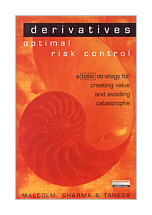|
||
• wydawnictwa polskie
• Zamów informacje o nowościach z wybranego tematu • kontakt
• Cookies na stronie |
DERIVATIVES OPTIMAL RISK CONTROL A TOTAL STRATEGY FOR CREATING VALUEMALKOLM F., SHARMA P., TANEGA J.wydawnictwo: FT/PH , rok wydania 1999, wydanie Icena netto: Do derivatives really threaten the stability of the financial world? Of course not. It's not derivatives per se that are dangerous. Forms of forwards, futures, options and swaps have been with us for centuries. The root of their risk lies in how and why they are used, and under what framework of control. Uncontrolled derivatives are bound to bum capital. Derivatives may appear impossibly complex to manage, but it doesn't have to be this way. We could be more vigilant, and we could introduce an integrated approach to risk management. Risk control could then become a custom, a good global habit, where the cost benefits of derivatives are seen clearly against their highly leveraged characteristics. But this imagined world is very far from the actual state of affairs of the financial world. The current world holds onto rather murky assumptions. For one, many managers may feel they! understand the inherent risks of many fin derivative transactions. Well here is a book aimed at mere mortal managers (not Nobel prize laureates) which does not rely on any mathematical formalism. Risk management need not be rocket science. The principles set out in the book act as ready-reckoning tools for anyone anywhere dealing with derivatives. Liquidity, market, credit, operational and legal risks are all explained and addressed. Integrate and internally regulate your risk systems into one holistic framework. Derivatives: Optimal Risk Control delivers a total strategy for controlling derivatives risk - one that is multi-dimensional, linking audit and risk management teams with traders and managers, and linking derivative operations with strategic objectives and capabilities. In an uncertain world of risk and return, this book offers clear steps to safety for the user of derivative instruments. Księgarnia nie działa. Nie odpowiadamy na pytania i nie realizujemy zamówien. Do odwolania !. |


